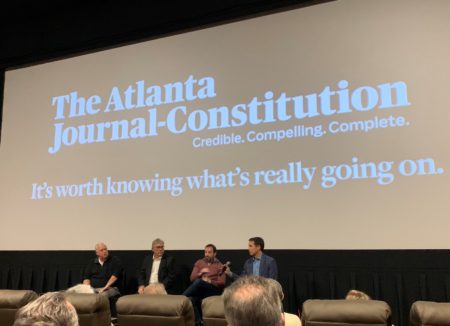Subscribers to the Atlanta Journal-Constitution packed a Sandy Springs movie theater Dec. 15 for private screenings of “Richard Jewell,” a film about the wrongly accused 1996 Olympics bombing suspect. Following the screenings, a panel of editors and expert authors discussed how they believed the movie to be true and where they say it strayed from reality.

The screenings were hosted as part of a strategy by the Dunwoody-based AJC to refute how the Warner Bros. film portrays its reporter, Kathy Scruggs, as using sex to get the scoop that Jewell, a heroic security guard who found the bomb, was at one time an FBI suspect in the case.
“Richard Jewell gets redemption in this movie,” said one panelist, former AJC Managing Editor Bert Roughton, to a theater of about 100 subscribers. “I don’t know who is going to redeem Kathy.”
That panel also included AJC Editor Kevin Riley; Kent Alexander, Atlanta’s chief federal prosecutor at the time; and Kevin Salwen, the Wall Street Journal’s regional editor during the Olympics. Alexander and Salwen are co-authors of “The Suspect” about Jewell’s life. Roughton, Alexander and Salwen also spoke in November at the Atlanta History Center to discuss Jewell, the FBI investigation and the newspaper coverage.
At the film screening, the panelists all praised the portrayal of Jewell and agreed the film casts him in the positive light he deserves.
Played by Olivia Wilde, the Scruggs character is brash and bossy and seemingly has no empathy until the end, when she learns Jewell is innocent. Roughton said the movie’s portrayal of Scruggs is “completely manufactured.”
In the film, Scruggs, a police reporter, is portrayed as wishing aloud that she hopes the bomber is “interesting.” The Scruggs character also seduces an FBI agent at a bar to give her the name of the suspect. After he tells her, she asks him where he wants to have sex.
“The only item of truth in that portrayal was she did in fact break the story,” Roughton said. “We worked hard to get that story. To suggest that she slept with a source, which is the cardinal sin of somebody who is a practicing journalist, is irresponsible and irredeemable as far as I am concerned.”
Roughton said Scruggs was “colorful and bigger than life,” but the film did not capture her spirit.
“It captured an interpretation of her spirit that somebody who had been consuming a lot of spirts might have conjured,” he said to some chuckles from the audience. “She was a fully formed, 3-dimensional, bigger-than-life newspaper reporter who didn’t need to sleep with sources and wouldn’t have.”
Salwen said it needed to be clear that “Richard Jewell” is a feature film and not a documentary. The title of the film is what the film is about, he said, and to their credit, the filmmakers “absolutely got [Jewell’s] character right.”
Salwen disagreed with Roughton about the film’s portrayal of Scruggs in the sense that it “captures a lot of her spirit.”
“I can have disputes with Bert about Kathy Scruggs’ character, but I just want to say the further you get away from the bullseye in a bio-pic, which is what this is, the more you have to use dramatics for characters to move the narrative along,” he said. “We can have discussions about certain details.”
Alexander backed up Roughton and said the U.S. Attorney’s office “found no evidence there was a trade for the story and sex.” He said Scruggs was “wonderful, larger than life.” He added that a former boyfriend told him that, “Kathy sold the sizzle, not the steak,” by wearing short, sexy skirts, for example.
Days before the screenings, the AJC sent a letter to the studio, director Clint Eastwood and others involved in the film, threatening legal action and accusing them of being “extraordinarily reckless” with how they portrayed the newspaper and Scruggs.
“The thing about the film that I want all of you to know as subscribers to the newspaper is … this is not how we work as journalists,” Riley said.

“Our motivations are not that way, and how we go about deciding what to do [are not that way],” he said. “The film at every turn portrays the journalism as poorly motivated and reckless.”
In addition to the implying Scruggs slept with an FBI agent to get the scoop, Riley said, the movie gets wrong how the AJC decided to publish the “FBI suspects ‘hero’ guard may have planted bomb” story on July 30, 1996. In the movie, the editor, John Walter, is surrounded by others pressuring him to publish the story so the hometown paper was not beat by competitors.
In actuality, the story was held for a day to gather more sources to confirm that Jewell was a suspect, Riley said. Riley also said the story was read verbatim to an FBI agent to ensure its accuracy and to make sure it did not interfere in their investigation. However, reading stories before they are published to sources is typically not acceptable journalistic standards.
Alexander acknowledged the FBI bumbled the investigation and said “there is no excuse to leak a suspect’s name that hasn’t been charged. Period.”
Alexander said in hindsight it would have been smart to release the 911 tape early in the investigation “when everyone in the world was listening in.” Because, he said, someone may have recognized the voice of the actual bomber, Eric Rudolph, and he may have been caught sooner.
“Let’s be fair. Richard Jewell is a hero,” Alexander said. “He should have been cleared a lot more quickly.”
Alexander did say that after Rudolph was captured, the FBI agents that worked the Olympics bombing case said his name never came up as a suspect.
To read more of the Reporter’s recent coverage related to the Olympics bombing, Richard Jewell and the film, click here.
